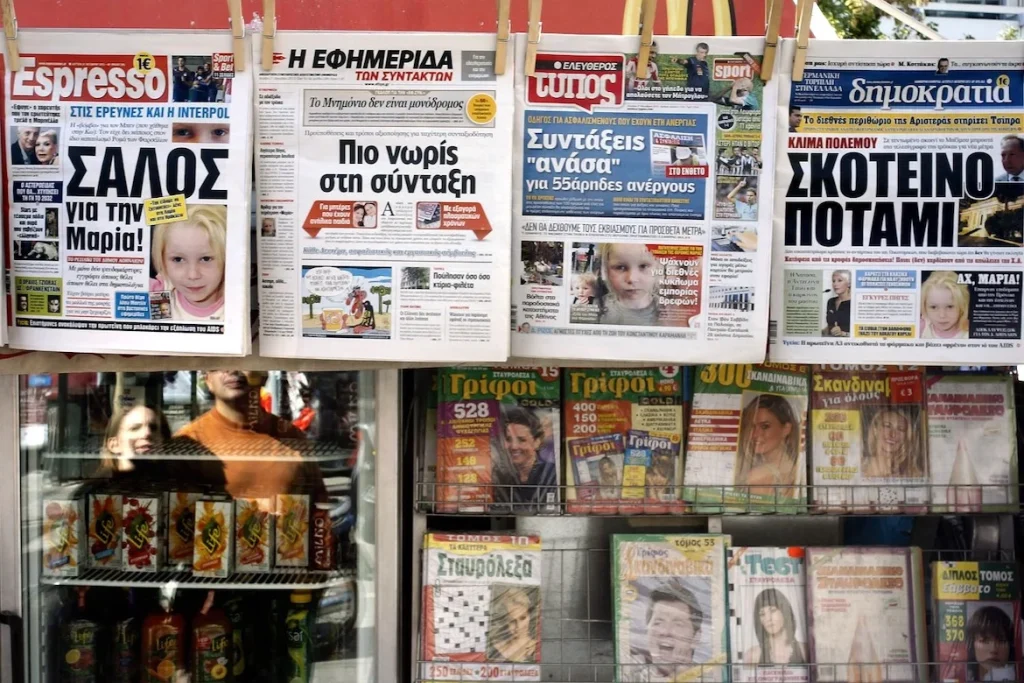Listen to the article
A significant transformation is underway in how Greek citizens consume news, according to a recent European Parliament study that reveals social media has overtaken television as the country’s primary information source.
The Flash Eurobarometer “Social Media Survey 2025,” conducted through online interviews between June 11-18, 2025, shows that 56% of Greeks now rely on social media platforms like Instagram, TikTok, Facebook, and X for their news consumption. This figure substantially exceeds the European Union average of 40%.
Television, which has historically dominated the Greek media landscape, now ranks as the second most popular news source at 54%. The shift represents a stark departure from trends across the rest of the EU, where 71% of citizens continue to rely primarily on television for daily news updates.
The digital transformation is happening alongside concerning trends in information quality. The survey revealed that 74% of Greeks encountered “fake news” or disinformation at least once during the week before participating in the study, exceeding the EU average of 66%. This growing prevalence of misinformation presents significant challenges for public discourse and democratic processes in Greece.
Traditional print media and their digital counterparts are struggling to maintain relevance amid this changing landscape. Only 34% of Greeks now turn to printed newspapers, magazines, or their online versions for information, compared to 41% across the EU. This decline suggests growing challenges for legacy media organizations attempting to navigate the digital transition.
Within Greece’s social media ecosystem, Facebook maintains its dominant position, with 68% of Greek social media users turning to the platform for news consumption—slightly higher than the EU average of 58%. However, clear generational differences are emerging in platform preferences.
Among Greeks aged 15-24, Instagram has established itself as the leading information source, with 66% of this demographic using it as their main channel for social and political current affairs. This trend aligns with similar patterns observed among young people across the European Union. For Greeks aged 25 and older, Facebook remains the predominant social media news source.
The findings illustrate a broader global trend of declining traditional media consumption, particularly among younger demographics who have grown up in the digital era. Social media platforms offer immediacy, interactivity, and personalized content experiences that many traditional media outlets struggle to match.
For media organizations and policymakers in Greece, these trends pose significant questions about ensuring access to quality information. With social media algorithms often prioritizing engagement over accuracy, concerns about information bubbles and polarization become increasingly relevant.
The shift also has implications for political communication in Greece. Politicians and public institutions must increasingly develop digital-first communication strategies to reach citizens where they now consume information. At the same time, they face the challenge of combating misinformation on platforms they don’t directly control.
Greece’s accelerated embrace of social media for news consumption compared to EU averages may reflect several factors, including the country’s rapid digital adoption in recent years, demographic trends, and potentially lower levels of trust in traditional media institutions following the country’s economic crisis.
As this digital transition continues, the balance between innovation and safeguarding information integrity remains a critical challenge for Greek society and its democratic institutions.
Verify This Yourself
Use these professional tools to fact-check and investigate claims independently
Reverse Image Search
Check if this image has been used elsewhere or in different contexts
Ask Our AI About This Claim
Get instant answers with web-powered AI analysis
Related Fact-Checks
See what other fact-checkers have said about similar claims
Want More Verification Tools?
Access our full suite of professional disinformation monitoring and investigation tools




9 Comments
Fascinating to see Greece leading the EU in digital news consumption. However, the high incidence of misinformation is a serious concern that policymakers must tackle proactively. Strengthening media literacy should be a priority.
Interesting to see how digital news consumption is evolving in Greece. While increased access to information is positive, the rise in fake news is concerning. Fact-checking and digital literacy initiatives will be crucial to combat misinformation.
The rise of social media as the primary news source in Greece is a complex development. While it democratizes information access, the fake news crisis must be swiftly addressed to protect the quality of public debate.
Greece’s shift towards social media for news is a significant trend, but the high prevalence of fake news is worrying. Maintaining a healthy, informed public discourse will require concerted efforts to improve media literacy and quality control.
You’re right, the fake news challenge is a complex issue that needs a multi-pronged approach. Educating citizens on identifying reliable sources and fact-checking will be key.
Greece’s transition to social media for news is a significant shift, but the fake news problem is alarming. Addressing this challenge through fact-checking, digital literacy programs, and platform accountability will be crucial.
I agree, a multifaceted approach is needed to combat the spread of misinformation and ensure citizens have access to reliable, trustworthy news sources.
Greece’s digital news consumption patterns are an interesting case study. The shift away from traditional media is notable, but the fake news challenge requires urgent attention to maintain a healthy, informed public discourse.
The dominance of social media as a news source in Greece is a double-edged sword. While digital platforms offer greater accessibility, the fake news problem needs to be addressed urgently to preserve the integrity of public discourse.